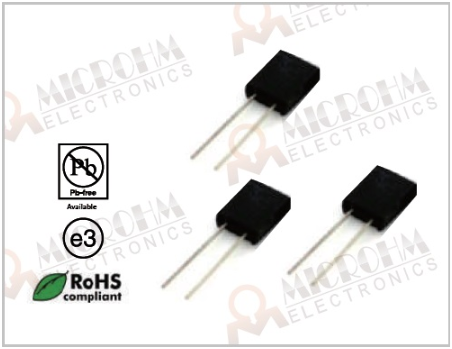Position:Home » Technical Articles
Resistance changes with temperature
Writer:Microhm Page View:Date:2020-01-19
The temperature coefficient of resistance, or TCR, is one of the main used parameters to characterize a resistor. The TCR defines the change in resistance as a function of the ambient temperature. The common way to express the TCR is in ppm/°C, which stands for parts per million per centigrade degree. Microhm Electronics can provide resistors with TCR as low as 1ppm/K.

Positive or Negative Temperature Coefficient of Resistance?
Resistors are available with a TCR that is negative, positive, or stable over a certain temperature range. Choosing the right resistor could prevent the need for temperature compensation. In some applications it is desired to have a large TCR, for example to measure temperature. Resistors for these applications are called thermistors, and can have a positive (PTC) or negative temperature coefficient (NTC).
Measuring methods for the TCR
The temperature coefficient of resistance for a resistor is determined by measuring the resistances values over an appropriate temperature range. The TCR is calculated as the average slope of the resistance value over this interval. This is accurate for linear relations, since the TCR is constant at every temperature. However, many materials have a non linear coefficient. For Nichrome for example, a popular alloy for resistors, the relation between temperature and TCR is not linear. Because the TCR is calculated as average slope, it is therefore very important to specify the TCR as well as the temperature interval. The way to measure TCR is standardized in MIL-STD-202 Method 304. With this method, TCR is calculated for the range between -55°C and 25°C and between 25°C and 125°C.

Values for TCR depend on metal material purity and temperature. Microhm Electronics use metal materials of relevant company to guarantee the quality of all kinds of resistors, especially for metal foil resistors and full metal resistors.

Positive or Negative Temperature Coefficient of Resistance?
Resistors are available with a TCR that is negative, positive, or stable over a certain temperature range. Choosing the right resistor could prevent the need for temperature compensation. In some applications it is desired to have a large TCR, for example to measure temperature. Resistors for these applications are called thermistors, and can have a positive (PTC) or negative temperature coefficient (NTC).
Measuring methods for the TCR
The temperature coefficient of resistance for a resistor is determined by measuring the resistances values over an appropriate temperature range. The TCR is calculated as the average slope of the resistance value over this interval. This is accurate for linear relations, since the TCR is constant at every temperature. However, many materials have a non linear coefficient. For Nichrome for example, a popular alloy for resistors, the relation between temperature and TCR is not linear. Because the TCR is calculated as average slope, it is therefore very important to specify the TCR as well as the temperature interval. The way to measure TCR is standardized in MIL-STD-202 Method 304. With this method, TCR is calculated for the range between -55°C and 25°C and between 25°C and 125°C.

Values for TCR depend on metal material purity and temperature. Microhm Electronics use metal materials of relevant company to guarantee the quality of all kinds of resistors, especially for metal foil resistors and full metal resistors.
Keywords:
Latest News
- Resistor's role in measuring and correcting LED,,,
- Single through-hole resistors' characteristics ,,,
- Why shunt resistors for current sense applicati,,,
- Metal-film resistors with small size, high resi,,,
- 36W High-Current Shunt Resistors MMS8420,,,
- 1W Surface Mount Resistor MPR1206,,,
- An Overview of Microhm Electronics' Resistor Pr,,,
- More anti-sulfur resistors used in harsh envir,,,
- Resistance changes with temperature,,,
- 140W TO247 High Power Heatsinkable Resistor,,,
- MMS5930 is ideal for current sensing in industr,,,
- Shunt resistors selection for engineers' design,,,
- Considerations for choosing precision resistors,,,
- Ceramic Encased Cement Resistors NWH Series for,,,
- Resistors for Passive Balancing in Battery-Pow,,,
Hot Articles
- Microhm will take part in 10th Automotive World,,,
- Thanks for Visiting Microhm's Booth E5-5706 in ,,,
- Resistors in Short Supply: Blame Cars,,,
- New lunch: High Power Precision Shunt Resistor,,,,
- How to Test a Resistor,,,
- Innovative Technology, Future Electric: Electri,,,
- What is Precision Resistors?,,,
- SMD Resistors Sizes and Packages,,,
- The Construction and Features of Metal Film Res,,,
- What is a TO-220 Resisor?,,,
- Hot Selling Products: Precision Shunt Resistors,,,
- How to Calculate the Equivalent Resistance Valu,,,
- What is a Fixed Resistor?,,,
- Resistors in LED Circuits,,,
- Resistors Types and Materials Overview,,,
Resistance applications
- Why Zero-Ohm Resistors?,,,
- Miniature future for passive electronic compone,,,
- The Measurement Accuracy of Automotive Shunt is,,,
- BMS for New Energy Vehicle,,,
- Precision Resistors' Construction and TCR,,,
- Difference Between High Precision Resistors and,,,
- The Four Important Functions of Alloy Resistors,,,
- Select the Right Resistor for Harmonic Filterin,,,
- Carbon Film Resistors' Features and Application,,,
- Industrial Roberts Applied to Solar Photovoltai,,,
- Heater Blower Motor Resistor in Air Conditioner,,,
- The Main Application for High Precision and Low,,,
- Shunt Resistor MMS8420 for High Current Stable ,,,
- Urbanization Development Bringing the Transform,,,
- Surface Mount Resistor's Size and Package ,,,
